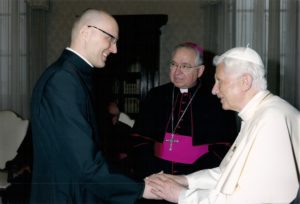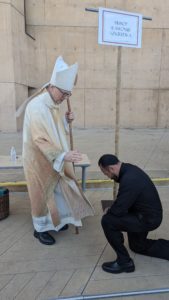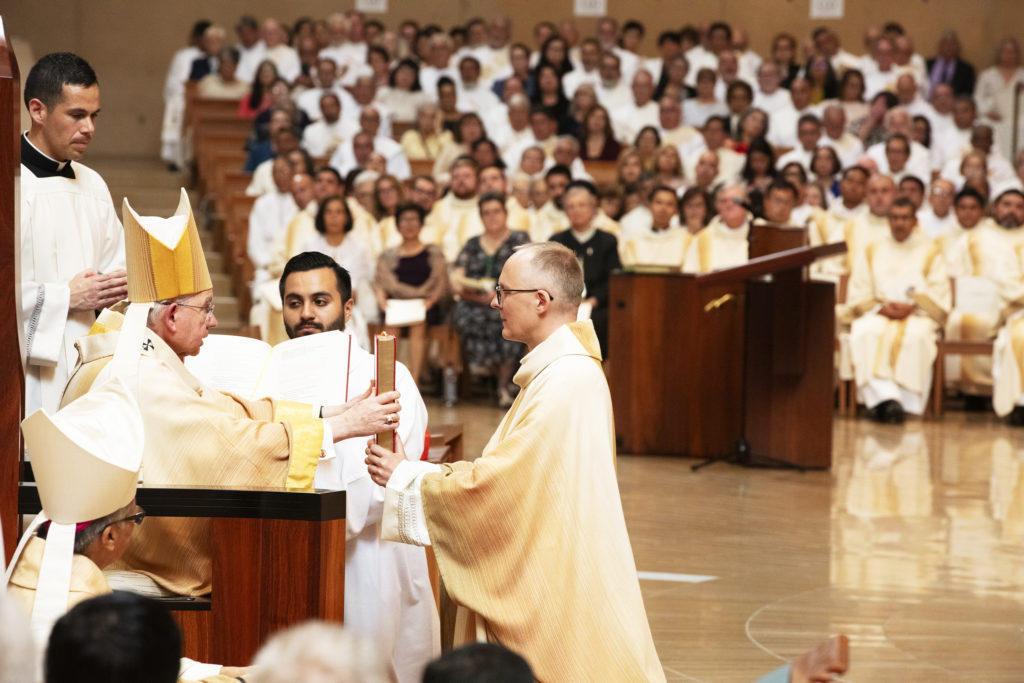When Father Slawomir Szkredka was first approached 15 years ago about going to graduate school in Rome to study Scripture, he wasn’t exactly excited.
“Don’t you have something else for me to study?” Szkredka told Msgr. Craig Cox, Vicar for Clergy for the Archdiocese of Los Angeles at the time.
The young priest already had a master’s degree in philosophy, and had studied elements of Buddhism as part of a doctorate in Religious Studies from the University of the West in Rosemead. Scripture seemed “tedious,” and if he was going to pursue another doctorate degree, he would’ve chosen theology or philosophy.
“No, you’ll like it,” Cox predicted.
It turned out to be the start of a love story, of sorts.
“I would say it became my vocation, but it also became my hobby,” said Szkredka, who admitted he spends his free time reading up on the newest ideas, trends, and developments in scriptural research and ancient languages.
But colleagues and students at St. John’s Seminary in Camarillo say Szkredka’s love for Scripture points to an even deeper love for Jesus, one that’s made a difference in the lives of people around him.
“He’s very enthusiastic all the time in class,” said St. John’s seminarian Jessie Valdovinos, who took Szkredka’s class on the Gospel of Matthew last year. “He's very attentive to his students and he’s always wanting to make us grow as seminarians.”
St. John’s seminarian Michael Croghan said that Szkredka has a “very clear” way of teaching in the classroom, able to take a small section of Scripture and then expound on it with depth.
“Kind of like a stiletto knife,” Croghan said.

Students of Szkredka past and present described him as insightful, fair, and a “go-to guy” when they have questions outside of class, a trustworthy authority on all things Bible. When it came to explaining Gospel passages whose interpretation has been debated over the years, Groghan said Szkredka wasn’t afraid to weigh in with his own expertise.
“Then you hear from Father Swavek, and you go like, ‘I want to remember that one, that seems like the definitive answer.’ ”
Father Gustavo Castillo has taught alongside Szkredka on the faculty of St. John’s since 2016. Until this year, they lived on the same floor. Castillo says Szkredka could be seen going into the seminary chapel throughout the day to pray before the Blessed Sacrament.
“He is what Balthasar (a famous 20th-century Catholic theologian) and Pope Benedict XVI said about theology on the knees, theology that comes from prayer.”
Castillo joined his friend in Rome a few years after Szkredka was sent to study at the prestigious Pontifical Biblical Institute in Rome, or “Biblicum.” Despite his obvious intelligence, Castillo said the experience abroad — or popularity he’s enjoyed at St. John’s since — hasn’t changed Szkredka.
“He never lost his humility, he never lost his sense of humor, and especially not his spirituality,” said Castillo, who studied spiritual theology at the Pontifical University of St. Thomas Aquinas (or “Angelicum”) in Rome, and now serves as director of Spiritual Formation at St. John’s.

From a pastoral perspective, Szkredka’s weekday job has allowed him to get to know ordinary Catholics from around the archdiocese on weekends, especially while helping out with Sunday Masses.
“There’s a real hunger for the word of God,” said Szkredka, who believes initiatives in the archdiocese like the Catholic Bible Institute as well as prayer groups are important places where Scripture can come alive for Catholics.
In homilies, he is known for being succinct and to the point, but leaving listeners with what Castillo calls “nuggets that you can take with you.”
When it comes to getting people to connect the word of God with their lives, Szkredka said it’s important that he start with himself.
“I confront myself with the word of God and I know God speaks to me through his word. I honestly try to imitate the example of our Blessed Mother. Her receptivity to the word, I think it marks my identity in the most profound way as a Christian.”
“Preaching, then, becomes just an extension, an invitation from God to share that experience,” said Szkredka, who published a book last year titled “Icon of Trust: Mary in the Gospels of Luke and John” (Sophia Institute Press, $13.95).
“So it’s not a job laid on top of different duties. It’s just an extension of what I see is essential to me as a Christian.”
Deacon Chris Sandner, regional deacon for the Santa Barbara Pastoral Region, has only worked with the new bishop for a few weeks, but said he’s already made an impression as an attentive, patient listener and prudent when it comes to speaking.
“He knows exactly what he wants to say and he says it concisely and he says it clearly,” said Sandner, who before this summer only knew Szkredka from seminary events and local deanery meetings in the Santa Barbara region. “He doesn’t wander all over the place.”
On a personal level, Sandner said he’s especially struck by the same deep, prayerful nature that colleagues like Castillo witnessed in the seminary.
“He prays a lot, and he prays spontaneously, and every opportunity with people is a chance to pray,” said Sandner. “I think he’s gonna be a great, great bishop just by his example.”
For now, Szkredka hasn’t given up the classroom quite yet. This semester, he is teaching a course on Matthew, Luke, and the Acts of the Apostles at St. John’s. Seminarian Valdovinos said he’s glad to be one of those in the class.
“He’s a very good witness of living the joy of the Gospel,” he said of his teacher. “He’s not faking it.”

